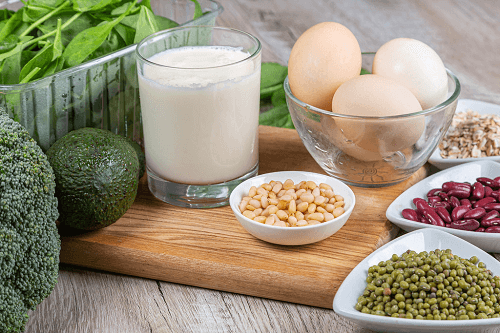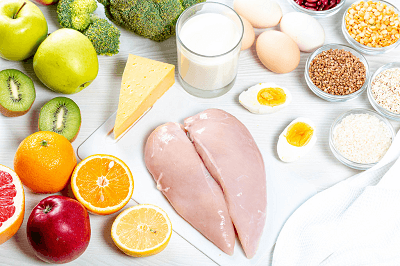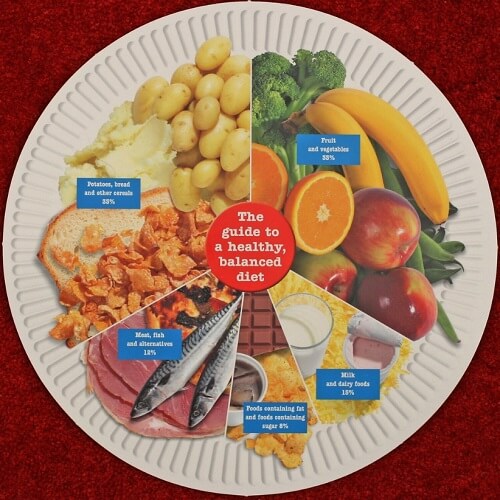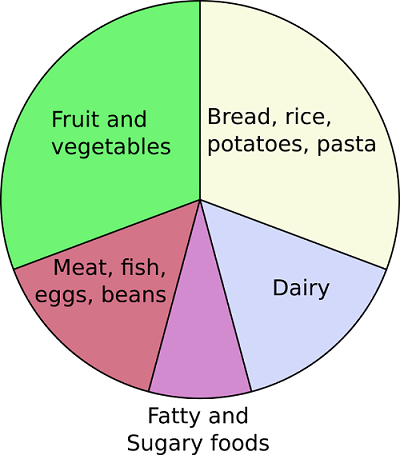Balanced Diet and Its ImportanceA balanced diet is the combination of different food items consumed together to get a balanced proportion of all the nutrients required by the body. A proper balanced diet includes all the essential meals of the day. It provides a different amount of proteins, carbohydrates, fats, vitamins, etc., along with a small amount of those nutrients that are not essential for normal living. These extra nutrients help to boost the immune system of the body. They help in giving extra protection to the body. 
The health of the immune system is as important as physical health. The immune system helps fight against foreign invaders and protects the body from diseases and infections. Another type of health that our eating habits take care of is mental health. Physical health and the immune system will only function properly when the person's mental health is good. The diet determines the state of mind. Depression and anxiety are the main factors influencing mental health. These can be controlled to a certain limit through proper diet and physical exercise. Apart from proteins, carbohydrates, and fats, a balanced diet should also include some bioactive phytochemicals like dietary fibers, nutraceuticals, and antioxidants. These phytochemicals additionally protect our bodies. Furthermore, there is a proper proportion of each nutrient category, which should be taken more or less similar to that amount only. Our diet should contain 60 to 70 percent carbohydrates, 20 to 25 percent calories, and 10 to 12 percent protein. 
Benefits Of a Balanced DietA proper balanced diet is required to maintain the health of the body. Good health means your body has more energy, stamina, and a strong immune system. These factors enhance normal body functions, increase metabolism, and help the body fight against different diseases. There are some major advantages of following a balanced diet. These include;
Nutrients, Vitamins, and Balanced Diet

CarbohydratesThe major energy source in all living organisms is carbohydrates or simple sugars. All types of organisms on this earth, whether plants or animals, simple or complex, derive energy from carbohydrates. The forms of carbohydrates like glucose and fructose are present in good quantities in fruits, vegetables, milk, honey, sugar, etc. Carbohydrates supply energy and make up a major component of dietary fiber. Carbohydrates are divided into two categories: simple and complex carbohydrates. Simple carbohydrates include sugars like glucose, fructose, lactose, and sucrose. In contrast, complex carbohydrates include starch, cellulose, etc. Cellulose is present in the cell wall of plants and is resistant to digestion in the human digestive system. In India, 72-80% of the total dietary calories are provided by carbohydrates found in plants like pulses, grains, and millets. There are two types of diets based on carbohydrates: a low-fiber diet and a fiber-rich diet. A fiber-rich diet slows down the absorption of carbohydrates and lipids. It also lowers blood glucose levels and cholesterol levels. It increases satiety and stool volume. On the other hand, a low-fiber diet is practically healthier because it is based on refined and processed foods rich in simple carbohydrates. ProteinsEvery live cell's basic structural and functional components are proteins. Muscle accounts for over half of our body's protein, with bone, cartilage, and skin accounting for the remainder. Proteins are large molecules made up of several amino acids. Because necessary amino acids are not produced in the human body, they must be acquired from protein sources in the diet. Protein is abundant in animal meals such as milk, meat, fish, eggs, and plant foods such as pulses and legumes. Proteins provide a variety of activities and energy (4 kcal/g). The body may synthesize other non-essential amino acids to make proteins. Protein quantity needs to be changed according to age, physiological state, and stress levels. Growing babies, children, pregnant women, and people require more proteins. Animal proteins are high quality because they include all essential amino acids properly. Most amino acids are provided by a mixture of grains, millets, and pulses, which complement each other to generate higher-quality proteins. Still, plant or vegetable proteins are of lower quality due to low levels of some important amino acids. FatsFats are a rich energy source, containing 9 calories per gram, and are composed of fatty acids in various amounts. Dietary fats come from two sources: the unseen fat included in plant and animal meals and the visible fats and oils added to the diet (cooking oil). Dietary visible fats are oils and fats like butter, ghee, and vanaspati. Fats facilitate the absorption of fat-soluble vitamins such as vitamins A, D, E, and K and carotenes. They also contain important polyunsaturated fatty acids. A sufficient amount of high-quality fat is required in the diet. Diets should include enough fat, especially for babies and children, to supply concentrated energy, as their energy demands per kilogram of body weight are approximately double those of adults. Adults should not eat saturated fats like ghee, butter, and hydrogenated fats. They are also advised to control their cholesterol intake by eating a low amount of red meat, organ meat, and eggs. Obesity, diabetes, cardiovascular disease, and cancer can all be caused by an excess of these molecules. Minerals and VitaminsPro-vitamins like beta-carotene are transformed into vitamin A. water-soluble vitamins cannot be kept in the body and are quickly eliminated in the urine. On the other hand, vitamins C and B come under water-soluble vitamins. B-complex and C vitamins are heat labile, which may be quickly destroyed by heat, air, or during drying, cooking, or food processing. Inorganic elements present in bodily fluids and tissues are known as minerals. Sodium, potassium, calcium, phosphorus, magnesium, and sulfur are significant macro minerals, whereas zinc, copper, selenium, and molybdenum are important micro minerals. These are quite necessary to maintain the basic health and structure of the skin, blood, nails, and soft tissue. Nerve cell transmission, acid/base and fluid balance, enzyme and hormone function, and blood clotting mechanisms are all governed. What Does It Mean to Have a Well-Balanced Diet?A balanced diet includes all the food items containing a proportion of the necessary elements. It's simple to achieve by combining the four fundamental dietary categories. The amount of food required to satisfy nutritional needs varies depending on age, gender, physiological state, and physical activity. Around 50 to 60% of the total calories come from carbohydrates, mainly from the complex carbohydrate category. 20-the body and 10 require 30% of fat and 15% of protein. The right proportion of these elements in the given quantities makes a well-balanced diet. 
Along with these elements, a non-nutrient element is also necessary. These non-nutrient elements include phytochemicals and antioxidants, along with some dietary fibers. Vitamins like riboflavin, selenium, vitamin C, and vitamin E are sources of antioxidants and have a very important role in protecting the body from free radical damage. Phytochemicals also provide antioxidant protection. Antioxidants are abundant in spices such as turmeric, ginger, garlic, cumin, and cloves. These are some general healthy eating guidelines:Some of the very important guidelines have always been given to us. For example, any meal of the day should not be kept. This is a very important point in terms of health because keeping mail slows down the body's metabolism and for the functioning Humans usually have three main meals a day along with two snacks in between. All three main meals are very important, but breakfast is the most important. To maintain a healthy lifestyle, one should learn how to prepare food so that healthy eating does not become difficult for him. A person should also develop the habit of eating raw foods like salads and fruits. Having vegetable juice and fruit juice is like an add-on. Skipping meals is one thing, but a person should also take care of overeating. It is very important to understand that we should never eat when we are full. This habit will help a person maintain, but it will also help maintain concentration, attention, and energy. To start a healthy diet, a proper menu should be made, including various items. 
Proper ratios are taken into account while making a balanced diet. A minimum of 4:1 of serial protein to pulse protein should be maintained. It is advised that a person should eat five pieces of fruit and vegetables every day and develop the habit of keeping a healthy snack on hand. This habit will protect the person from developing a bad slag habit whenever hungry. Proper cooking habits are also necessary for healthy eating, like removing any visible fat from the meat, like fish skin, chicken skin, or white fat. Avoid large doses of caffeine, alcohol, and processed sugar because they are all stimulants. Dining out should be avoided as much as possible. Cooking Suggestions for a Healthy DietPeople have lost that tradition, and in a way, the traditional cooking methods have also changed a lot in two decades. People prefer less healthy fast meals like ready-to-eat packs and other food items from convenience sources. The trend of restaurants and home delivery also greatly impacts healthy eating. People should always remember that a nutritious dinner can only be prepared at home, not fancy restaurants. 
People get bored with eating the same food or taste, so they switch to restaurant food. To avoid the situation, people should add diversity to the menu. Infuse the meals with different flavors that suit you. It is never suggested to give up your favorite food; rather, you should make it at home in the healthiest way possible. Some of the tips that can make home-based food a little healthier -
Next TopicBacterial Transformation
|
 For Videos Join Our Youtube Channel: Join Now
For Videos Join Our Youtube Channel: Join Now
Feedback
- Send your Feedback to [email protected]
Help Others, Please Share









